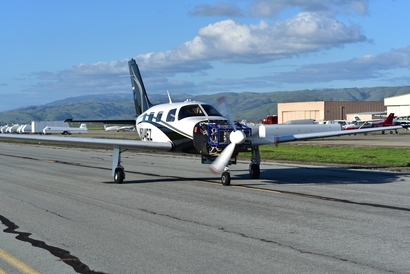
The HyFlyer project aims to decarbonise medium range small passenger aircraft by demonstrating powertrain technology, replacing conventional piston engines in propeller aircraft. The conventional powertrain in the aircraft will be replaced with electric motors, hydrogen fuel cells and gas storage.
Led by ZeroAvia, developers of hydrogen fuel cell powertrain solutions, HyFlyer will demonstrate a phased approach from battery power to hydrogen power, integrating the new technology aboard a Piper M-class six-seater aircraft which will perform test flights out of Cranfield and Orkney.
Project partners Intelligent Energy will optimise its high power fuel cell technology for application in aviation whilst EMEC Hydrogen, producers of green hydrogen from renewable energy, will supply the hydrogen required for flight tests and develop a mobile refuelling platform compatible with the plane.
ZeroAvia have already demonstrated their technology in flight tests in the US, and have recently set up an office in Cranfield, UK to work closely with Cranfield Aerospace Solutions (CAeS) to integrate and certify the hydrogen powertrain technology and perform initial flight tests.
The project will culminate in a 250-300 nautical mile (NM) demonstration flight out of an airfield based in Orkney.
According to the Air Transport Action Group, aviation is responsible for 12 per cent of CO2 emissions from all transport sources and is one of the fastest growing sources of global emissions. HyFlyer presents significant opportunities to decarbonise aviation in Orkney since all flights from Kirkwall could potentially be serviced by this new technology.
“The substantial backing provided by the UK Government underlines the potential that hydrogen holds as a fuel source for commercial aviation and provides significant validation of ZeroAvia’s approach to zero emission flight” said Val Miftakhov, Founder and CEO of ZeroAvia. “Our project goal of 300 NM is equivalent to the distance from London to Edinburgh and will prove that zero emission aviation, powered by hydrogen, can play a key role within the UK and other countries’ transport strategies - enabling net zero targets to be met and improving productivity and regional prosperity.”
Councillor James Stockan, Leader of Orkney Islands Council, added that Orkney is seeking to be clean, green islands and that transport is the islands biggest decarbonisation challenge, as its remote and rural setting places islanders in the position of producing a significant carbon footprint.
The UK Government grant awarded to the HyFlyer project is part of the ATI programme, supported by the Department for Business, Energy & Industrial Strategy (BEIS), the Aerospace Technology Institute (ATI) and Innovate UK. The Government’s grant is matched by Project HyFlyer participants, making the scope of the project in excess of £5 million.
For additional information:

